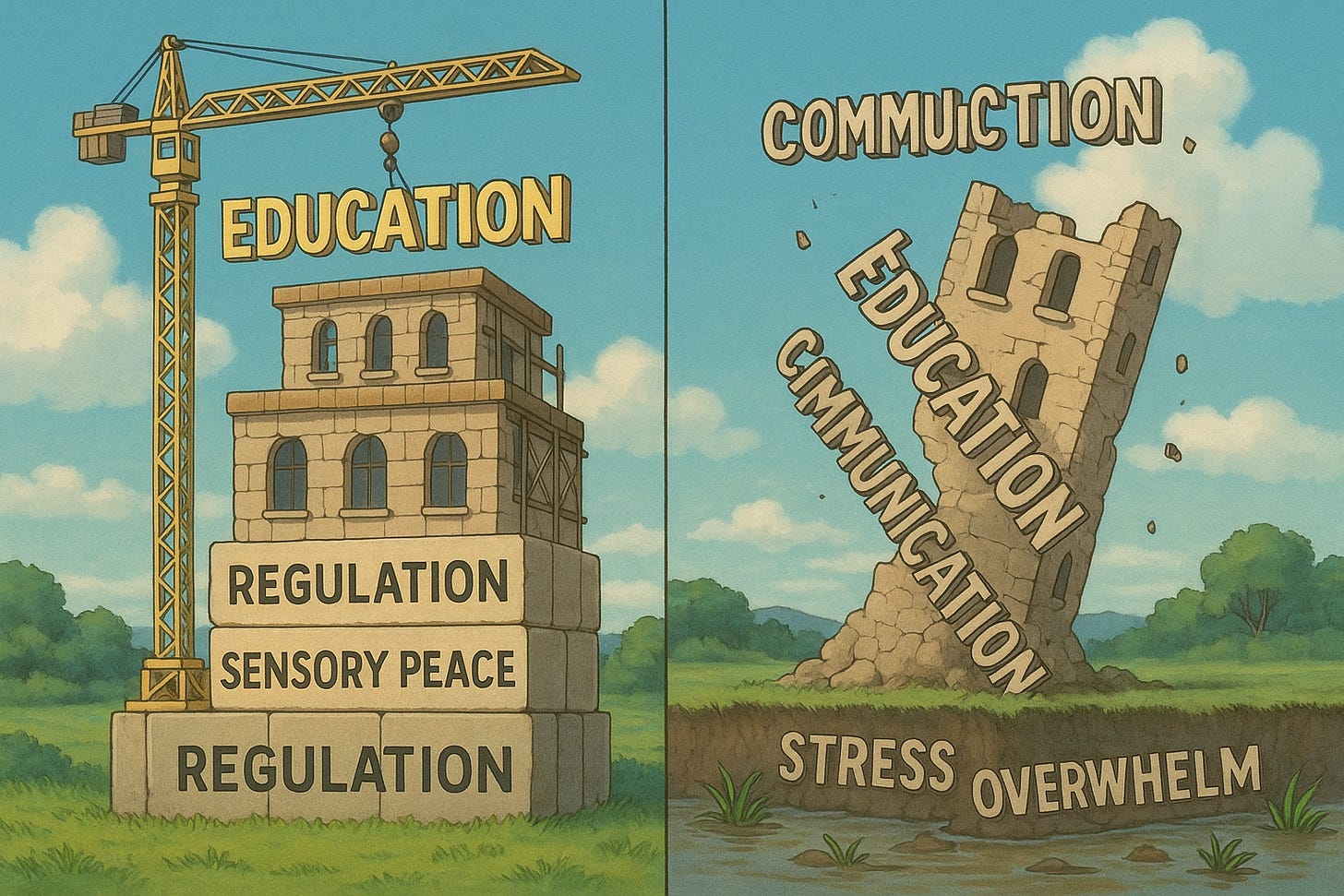You Can't Learn While Drowning.
Creating a homeschool built on regulation, sensory peace, and mutual respect
Rafael’s quotes appear in ALL CAPS and are shared exactly as spelled, preserving authenticity—including any misspellings—because while extremely mature, he’s still an 8 year old learning the nuances of English.
Let’s be real for a second.
Homeschooling your non-speaker is no joke.
There is no “honey, have you done your homework?” It’s hard to even explain to anyone who doesn’t have direct experience supporting non-speakers what it truly entails.
And at the same time, you know that there is literally no choice.
It’s either that or they are locked in a segregated classroom with no education.
So you press on, day to day, fighting for a better future for your non-speaker.
It has been almost a year since we started homeschooling Rafael. Seems like thirty.
There have been highs and lows.
The beginning especially has been a bumpy ride, but I won’t trade it for anything in the world, because during this time I got to know the real Rafael.
Not the always smiling boy jumping on a yoga ball.
But the real deep thinker, who is aware of injustices in the world and is ready to work hard to change things for the better. I am glad you are getting to know the real Rafael too.
The Person behind Dysregulation
I’m sharing all of this because homeschooling a non speaker can be the biggest treasure and the biggest curse.
I can’t promise you that every day is going to be easy, but I can totally promise you that you can turn a slightly challenging situation into a living hell for both yourself and your non-speaker.
The reason I am able to get to know the real Rafael is not just because we found spelled communication, although of course that wouldn’t have happened without it.
It’s also because we have prioritized his regulation, emotional peace and body control often times over what we can accomplish in a given day.
When you have a non speaker, it’s easy to get lost in all the things that need to be done.
The therapies, spelled communication, motor, education, speech? While literally caring for them depending on their level of support needs day to day.
It’s easy to feel like you are never getting ahead and try to stuff every day to the brink with various activities to build a better future for them. Afterall what parent doesn’t want the best for their kid?
So we did this too. Had a bunch of therapies, going from one place straight to another and seeing how we can fit one more thing into his schedule.
Except for it had the opposite effect.
The main contribution of the packed schedule was not to Rafael’s skill but to his stress level and frequent dysregulation.
The Sensory Hell
So as you are navigating your homeschooling journey with your non speaker, whether you just started or have been doing this for years, remember this.
You are supporting someone:
Who likely doesn’t have “sound filter” and hears everything amplified
Who can perceive people’s emotion with incredible acuity and know what people are thinking about them
Who will be highly affected by said emotions and will have to work really hard to stay regulated….
While also knowing that if they lose regulation battle, they will have to endure even more judgement and harsh looks from people who have literally no idea what they are going through on a daily basis.
Oh, yes… all of this is before the actual work associated with this or that activity, that is likely to be excruciatingly hard on its own.
It’s only now I’ve realized just how hard Rafael works.
It’s so easy to mistake dysregulation for laziness, stubbornness or lack of motivation.
Even for those of us who are exposed to spelled communication and try our darndest to presume competence.
But if we truly presume competence, we need to give them agency and space to do what they need to do.
HOW MANY HOURS YOU STUDY IS NOT AS IMPORTANT AS THE QUALITY OF THOSE HOURS.
BEING DYSREGULATED SUCKS AND DOING TOO MUCH LEADS TO DYSREGULATION.
But Daria… you said it yourself… There is just so much to be done. How do you do it all? How do you not stress about it?
As the saying goes: “We overestimate what we can accomplish in a day and underestimate what we can do in a year.”
When you create a schedule that is comfortable for your non-speaker and you let them have time and space to regulate themselves, in time their capacity will grow.
Capacity to regulate, to communicate and to learn.
When we just started homeschooling, there was much trauma to process. Dysregulation was an often occurrence and we worked really hard in supporting Rafael in this aspect in all sorts of ways.
Meditation music, clean environment, vagus nerve stimulation, car rides, bath, you name it.
Now, while we have these tools in our tool box for when we need them, we actually don’t need them that much.
We can focus on communication and education when we have a fairly regulated baseline. But it took “work” aka prioritizing regulation *above all else* to get here.
In other words, when you take the time to build a solid foundation of regulation, you can then progress so much faster and build an actual “massive building” - complex communication and education - on that foundation.
By contrast, if you try to forgo the regulation part, you are trying to “build a skyscraper on a swamp”. It’s just not going to work and it will keep falling apart.
The other important part to understand is education only comes through sensory channels. And if one has sensory sensitivity, education may be overwhelming at first, *even if* they desperately want to learn.
They need to grow their capacity not just for regulation itself, but for consuming material and navigating sensory stimulation of learning.
This concept is something I’ve learned from Vaish Sarathy, OG speller parent, and her course Non Linear Education.
In the beginning, Rafael literally could only listen to 5 minutes of audiobook and that’s it. More than that was dysregulating.
Slowly but surely, we increased his capacity.
First 6 minutes, then 7, then 8.. and now he can listen to a complex book/podcast for 20 minutes or more.
I didn’t know how long it would take us to get here, but I needed to believe we would, and go at his pace.
(This is why I'm purposefully not including a specific timeline, because it’s not a competition and you need to go with the speed of your non-speaker).
I hear you, Daria… and I understand… I’m just afraid we won’t ever get anywhere at this speed.
Here’s the good news.
In traditional school much of the time is spent NOT teaching. Between checking attendance, reasserting control and managing a class of 30 people, a lot of time is wasted.
When you homeschool, you don’t need all of that.
You do not need to check attendance of 30 people or ask a question of the whole class.
You don't have to reprimand someone chatting with a friend or explain everything in 3 different ways.
You just need to teach your child at their own pace—which, I bet, will be faster than that of a typical classroom.
Faster? Are you kidding?
I share a glimpse of this in The Fog of Dysregulation, but it bears repeating.
More complex and challenging material is helping non speakers to regulate.
They literally NEED difficulty and complexity to organize their brain, to truly engage, to regulate. And the great thing is, most of the time when you go for complex material, say high school chemistry or biology, you are not actually losing anything from previous grades.
A lot of the time, it is the same material that was covered in the middle school, just at the new level of complexity. But for non speakers, they don’t need the “dumbed down” version. They want the true, in depth version right away.
And even if you are encountering something you missed, you can always come back and learn it. That is the perk of homeschooling after all - you decide what you teach and when. (Obviously, check your local laws on any restrictions in this regard).
MY BRAIN LITERALLY NEEDS COMPLEX INFORMATION TO BETTER FUNCTION AND STAY REGULATED.
CHEMISTRY SPECIFICALLY IS SO MIND BENDING THAT MY BODY STOPS FOR ONCE. CONSTANT MOVEMENT IS EXHAUSING AND CHEMISTRY GIVES A MUCH DESIRED BREAK.
I know this is not very precise.
I wish I could give you a cookie cutter strategy and promise it's going to work. But such a cookie cutter strategy doesn't exist for regular kids, let alone non-speakers.
And most importantly, if you want your non speaker to shine, you need to give them space to do so.
If you want them to communicate on a level of depth with you, you need to believe they have that level of depth to begin with.
And that means working with them in partnership. Asking for feedback, listening, implementing.
Yes, even if they are not quite open in their communication.
Sharing things with them, asking for their opinion even if that means giving them a whiteboard with options to choose.
The unfortunate truth is, they have been excluded more times than we know.
The least we can do is include them into decisions about their own homeschooling journey.
EDUCATION IS NOT JUST ABOUT LEARNING FOR NON SPEAKERS. IT IS A LIFELINE.
IT IS SOMETHING TO LOOK FORWARD TO EVERYDAY AND SURVIVE ANOTHER DAY OF BEING IN THIS CRAZY BODY.
Resources:
Non Linear Education by Vanish Sarathy.
This course changed how I view homeschooling and education in many ways. What I share in this article is just one aspect of many. (This is an affiliate link, which means we earn a small commission if you choose to enroll at no cost to you. We only recommend what we personally tried and found helpful).
We use Khan Academy for 95% of our curriculum. It's free it has variety of subjects and grades with informative videos Rafael can listen to and quizzes you can easily adapt to spelling and/or whiteboard with your non speaker.




Actually as a pharmacist I'm a big fun of chemistry so happy with your choice. Just interested in your thoughts about it.
Rafael, why chemistry? From the first glance it seems math is deeper and wider, but you chose chemistry. Why?